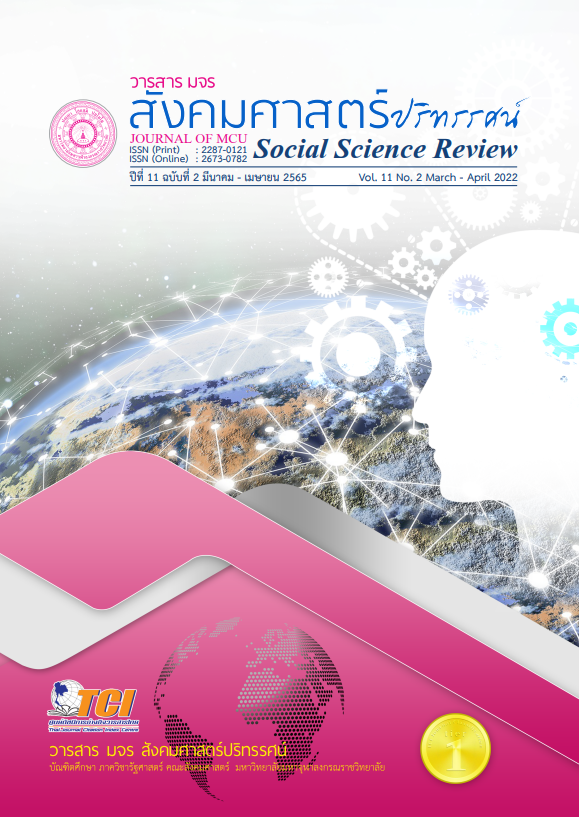นวัตกรรมทางสังคมกับแนวทางการพัฒนาเครือข่าย สัมมาชีพชุมชนอย่างยั่งยืน
คำสำคัญ:
นวัตกรรมทางสังคม, การพัฒนาชุมชน, ความยั่งยืน, เครือข่ายสัมมาชีพ, ชุมชนบทคัดย่อ
การวิจัยครั้งนี้มีวัตถุประสงค์เพื่อ 1) ศึกษาปัจจัยความสำเร็จของการพัฒนาเครือข่ายสัมมาชีพ 2) ถอดบทเรียนแนวทางการยกระดับศักยภาพเครือข่ายสัมมาชีพให้มีความยั่งยืน และ 3) พัฒนารูปแบบการสร้างนวัตกรรมเครือข่ายสัมมาชีพ ใช้วิธีการวิจัยเชิงคุณภาพเก็บข้อมูลจากผู้แทนกลุ่มสมาชิกภายในชุมชนของเครือข่ายสัมมาชีพและผู้แทนหน่วยงานภาครัฐที่เกี่ยวข้อง จำนวน 60 คน โดยการสุ่มแบบเฉพาะเจาะจง โดยมีเครื่องมือการวิจัยคือ แบบสัมภาษณ์เชิงลึก และแบบสนทนากลุ่ม อาศัยการวิเคราะห์ข้อมูลเชิงเปรียบเทียบและการวิเคราะห์แบบแก่นสาระ
ผลการวิจัยพบว่า 1) ปัจจัยความสำเร็จของการพัฒนาเครือข่ายสัมมาชีพ พบว่า องค์ความรู้ที่เกิดขึ้นและสามารถสนับสนุนการพัฒนาเครือข่ายสัมมาชีพได้คือ องค์ความรู้ภูมิปัญญาท้องถิ่นและองค์ความรู้การบริหารกลุ่มอย่างมีส่วนร่วม ภายใต้ปัจจัยความสำเร็จ 4 ด้าน ได้แก่ ด้านการสื่อสาร ด้านความคิดสร้างสรรค์ ด้านความเสียสละ และด้านการสรุปบทเรียน 2) ถอดบทเรียนแนวทางการยกระดับศักยภาพเครือข่ายสัมมาชีพให้มีความยั่งยืน พบว่า การยกระดับเครือข่ายสัมมาชีพจำเป็นต้องอาศัยการเรียนรู้เพื่อเข้าใจพื้นที่ การปรับใช้เทคโนโลยีและนวัตกรรมที่เหมาะสมโดยเฉพาะนวัตกรรมเครือข่ายทางสังคมที่เข้มแข็ง ความยั่งยืนในการพัฒนา และการมุ่งสู่การพัฒนาเพื่อการเปลี่ยนแปลงเชิงสร้างสรรค์ และ 3) พัฒนารูปแบบการสร้างนวัตกรรมเครือข่ายสัมมาชีพ พบว่า การพัฒนารูปแบบการสร้างนวัตกรรมเครือข่ายสัมมาชีพสู่ระดับนโยบายจะต้องอาศัยการสร้างผู้นำ การสร้างเครือข่ายผ่านกิจกรรมการพัฒนาอย่างมีส่วนร่วม และการติดตามประเมินผลเพื่อแลกเปลี่ยนองค์ความรู้
เอกสารอ้างอิง
จามะรี เชียงทอง. (2549). สังคมวิทยาการพัฒนา. กรุงเทพฯ: สำนักพิมพ์โอเดียนสโตร์.
นภาภรณ์ หะวานนท์ และคณะ. (2550). ทฤษฎีฐานรากในเรื่องความเข้มแข็งของชุมชน. กรุงเทพฯ: สำนักงานกองทุนสนับสนุนการวิจัย.
ปรีชา คุวินทร์พันธุ์. (2547). พะเยาท่ามกลางกระแสโลกาภิวัตน์ความเป็นท้องถิ่น: หนึ่งตำบลหนึ่งผลิตภัณฑ์การท้องเที่ยว. กรุงเทพฯ: จุฬาลงกรณ์มหาวิทยาลัย.
ปังปอนด์ รักอำนวยกิจ และคณะ. (2561). การส่งเสริมการท่องเที่ยวในจังหวัดรองและมีรายได้น้อย เพื่อลดความเหลื่อมล้ำ: การศึกษากลุ่มจังหวัดอีสานใต้ (ยโสธร ศรีสะเกษ อำนาจเจริญ). กรุงเทพฯ: สำนักงานคณะกรรมการส่งเสริมวิทยาศาสตร์ วิจัยและนวัตกรรม
ปิ่นแก้ว เหลืองอร่ามศรี. (2554). มโนทัศน์การดำรงชีพ. เชียงใหม่: พงษ์สวัสดิ์การพิมพ์.
พระสุธีรัตนบัณฑิต. (2561). List Model for Research and Social Development. พระนครศรีอยุธยา: สถาบันวิจัยพุทธศาสตร์ มหาวิทยาลัยมหาจุฬาลงกรณ์ราชวิทยาลัย.
ศุภฤกษ์ ธาราพิทักษ์วงศ์ และคณะ. (2562). การยกระดับผลิตภัณฑ์และสร้างเครือข่ายวิสาหกิจ ชุมชนเพื่อสนับสนุนการพัฒนาอย่างยั่งยืนของจังหวัดแม่ฮ่องสอน. กรุงเทพฯ: สำนักงานกองทุนสนับสนุนการวิจัย.
สรรณ์ญา กระสังข์ และคณะ. (2560). การสร้างกระบวนการเรียนรู้เพื่อสร้างสัมมาชีพชุมชนในพื้นที่อำเภอปรางค์กู่และอำเภอห้วยทับทัน จังหวัดศรีสะเกษ. กรุงเทพฯ: สำนักงานกองทุนสนับสนุนการวิจัย.
สฤณี อาชวานันทกุล. (2562). มายานวัตกรรม. กรุงเทพฯ: ซอลท์.
สายชล ปัญญชิต, และพฤทธิ์ ศุภเศรษฐศิริ. (2561). ภูมิปัญญากับการพัฒนา: บทวิเคราะห์ว่าด้วยการบวชป่าเพื่อการพัฒนาอย่างยั่งยืน. วารสาร มจร สังคมศาสตร์ปริทรรศน์, 8(1), 253-263.
สุริชัย หวันแก้ว (2561). วาระการพัฒนาโลกกับอนาคตไทย – กระแสปฏิรูปอ่อนล้าหรือเดินในเขาวงกต?. วารสารสังคมศาสตร์ มหาวิทยาลัยเกษตรศาสตร์, 44(1), 1-18.
หทัยรัตน์ บุณโยปัษฎัมภ์. (2561). ภูมิปัญญาท้องถิ่นกับการพัฒนา. กรุงเทพฯ: รุ่งเรือง.
Bourdieu, P. (1986). The forms of capital. In Handbook of theory and research for the sociology of education. New York: Greenwood.
Putnum, R. (1993). Making democracy work: Civic traditions in modern Italy (Graduate’s Thesis). Princeton University. Princeton.
ดาวน์โหลด
เผยแพร่แล้ว
รูปแบบการอ้างอิง
ฉบับ
ประเภทบทความ
สัญญาอนุญาต
ลิขสิทธิ์ (c) 2022 วารสาร มจร สังคมศาสตร์ปริทรรศน์

อนุญาตภายใต้เงื่อนไข Creative Commons Attribution-NonCommercial-NoDerivatives 4.0 International License.
เพื่อให้เป็นไปตามกฎหมายลิขสิทธิ์ ผู้นิพนธ์ทุกท่านต้องลงลายมือชื่อในแบบฟอร์มใบมอบลิขสิทธิ์บทความให้แก่วารสารฯ พร้อมกับบทความต้นฉบับที่ได้แก้ไขครั้งสุดท้าย นอกจากนี้ ผู้นิพนธ์ทุกท่านต้องยืนยันว่าบทความต้นฉบับที่ส่งมาตีพิมพ์นั้น ได้ส่งมาตีพิมพ์เฉพาะในวารสาร มจร สังคมศาสตร์ปริทรรศน์ เพียงแห่งเดียวเท่านั้น หากมีการใช้ภาพหรือตารางหรือเนื้อหาอื่นๆ ของผู้นิพนธ์อื่นที่ปรากฏในสิ่งตีพิมพ์อื่นมาแล้ว ผู้นิพนธ์ต้องขออนุญาตเจ้าของลิขสิทธิ์ก่อน พร้อมทั้งแสดงหนังสือที่ได้รับการยินยอมต่อบรรณาธิการ ก่อนที่บทความจะได้รับการตีพิมพ์ หากไม่เป็นไปตามข้อกำหนดเบื้องต้น ทางวารสารจะถอดบทความของท่านออกโดยไม่มีข้อยกเว้นใดๆ ทั้งสิ้น





